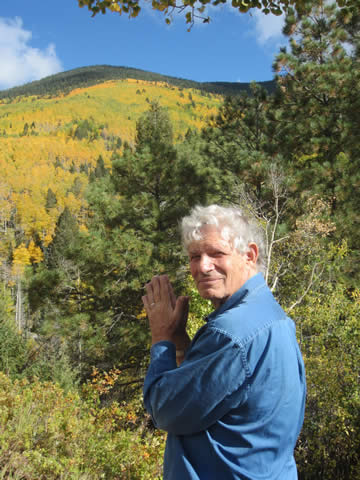|
THE SCIENCE OF CONSCIOUSNESS
April 25-30, 2016 - Tucson, ARIZONA
Loews Ventana Canyon Resort
PLENARY
SATURDAY
April 30, 2016
PL 11 - Quantum Approaches 2
11:10 am to 12:30 pm

Stuart Kauffman, MD
Theoretical Biologist
Complex Systems Researcher
The Institute for Systems Biology, Seattle
Stuart Alan Kauffman is an American theoretical biologist and complex systems researcher who studies the origin of life on Earth. Kauffman graduated from Dartmouth in 1960, was awarded the BA (Hons) by Oxford University (where he was a Marshall Scholar) in 1963, and completed a medical degree (MD) at the University of California, San Francisco in 1968. After completing his residency in Emergency Medicine, he moved into developmental genetics of the fruitfly, holding appointments first at the University of Chicago 1969-1973, National Cancer Institute 1973-1975, then at the University of Pennsylvania from 1975 to 1995, where he served as Professor of Biochemistry and Biophysics. Kauffman held a MacArthur Fellowship, 1987–1992. He also holds an Honorary Degree in Science from the University of Louvain; and was awarded a Gold Medal of the Accademia Lincea in Rome.
Kauffman proposed the self-organized emergence of collectively autocatalytic sets of polymers, specifically peptides, for the origin of molecular reproduction. Reproducing peptide, DNA, and RNA collectively autocatalytic sets have now been made experimentally. He is best known for arguing that the complexity of biological systems and organisms might result as much from self-organization and far-from-equilibrium dynamics as from Darwinian natural selection, as well as for applying models of Boolean networks to simplified genetic circuits. His hypotheses stating that cell types are attractors of such networks, and that genetic regulatory networks are "critical" have found experimental support. Kauffman rose to prominence through his association with the Santa Fe Institute (a non-profit research institute dedicated to the study of complex systems), where he was faculty in residence from 1986 to 1997, and through his work on models in various areas of biology. These included autocatalytic sets in origin of life research, gene regulatory networks in developmental biology, and fitness landscapes in evolutionary biology. Kauffman holds the founding broad biotechnology patents in combinatorial chemistry and applied molecular evolution.
In 1996, Kauffman started BiosGroup, a Santa Fe, New Mexico-based for-profit company that applied complex systems methodology to business problems. BiosGroup was acquired by NuTech Solutions in early 2003. NuTech was bought by Netezza in 2008. From 2004 to 2009 Kauffman held a joint appointment at the University of Calgary in Biological Sciences and Physics and Astronomy. He is also an Adjunct Professor in the Department of Philosophy at the University of Calgary. He is an iCORE (Informatics Research Circle of Excellence) chair and the director of the Institute for Biocomplexity and Informatics. In January 2009 Kauffman became a Finland Distinguished Professor (FiDiPro) at Tampere University of Technology, Department of Signal Processing. The appointment went until the end of 2012. The subject of the FiDiPro research project is the development of delayed stochastic models of genetic regulatory networks based on gene expression data at the single molecule level. In January 2010 Kauffman joined the University of Vermont faculty where he continue his work with UVM's Complex Systems Center through the Fall of 2012. He is also an adviser to the Microbes Mind Forum, and is now Emeritus Professor of Biochemistry and Biophysicss, the School of Medicine, University of Pennsylvania, and Affiliate Faculty The Institute for Systems Biology, Seattle.
Dr. Kauffman's recent work translates his biological findings to the mind body problem and issues in neuroscience, proposing attributes of a new "poised realm" that hovers indefinitely between quantum coherence and classicality. Kauffman published on this topic in Answering Descartes: Beyond Turing (Kauffman, published on line ECAL 11, and In press, Cambridge University; Kauffman, 2016). With colleagues Giuseppe Longo and Maël Montévil, Stuart Kauffman wrote (January 2012) "No entailing laws, but enablement in the evolution of the biosphere", which aims to show that evolution is not law entailed, as is physics, and that, without selection, evolution enables its own future possibilities. Recent work posted on Physics ArXiv includes "Beyond the Stalemate: Mind/Body, Quantum Mechanics, Free Will, Possible Panpsychism, Possible Solution to the Quantum Enigma" (October 2014) and "Quantum Criticality at the Origin of Life" (February 2015).
Dr. Kauffman has published over 200 articles and 4 books: The Origins of Order (1993), At Home in the Universe (1995), Investigations (2000), and Reinventing the Sacred (2008). A fifth book, Humanity in a Creative Universe is in press for 2016, with Oxford University Press for publication February 2016.
|